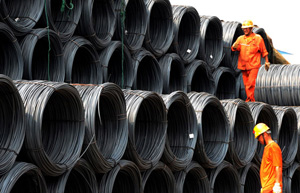Charting the right strategies for a leaner, profitable steel industry
By Du Juan (China Daily) Updated: 2014-09-03 07:24With overcapacity and weak demand putting the sector in the red, the government is taking drastic steps, reports Du Juan.
The deep reforms that China's steel industry is undergoing, following years of weak demand and severe overcapacity from the country's rapid development, are a positive signal, experts said.
"The expansion impulse in the steel industry has stopped," Wang Xiaoqi, deputy head of the China Iron and Steel Association, said on Aug 21.
Steel industry investment for the first six months of this year declined 7.08 percent from the same period last year to 237.5 billion yuan ($38.6 billion), according to the association.
 |
 |
The central government is cutting steel production to solve overcapacity issues and protect the environment.
The Ministry of Industry and Information Technology announced in July the first list of 74 iron and steel companies that must shut down outdated production lines. The second list, announced in August, involved two steel-smelting companies, as the country's economic slowdown has also led to weakening steel demand.
The association said the sharp drop in real estate investment for the first six months of the year greatly affected steel consumption.
Investment in the real estate sector grew 14.1 percent year-on-year, 6.2 percentage points less than the same period last year.
New construction declined 16.4 percent year-on-year. A lack of new construction in the second half will continue to constrain steel consumption, the association said.
"Except for steel projects under construction, there will be no more new production capacity in steel refining, which means the overcapacity problem that has existed for a long time is beginning to ease," Wang said.
Zhang Changfu, secretary-general of the association, said steel consumption driven by economic growth will continue to decrease because of the country's economic restructuring, which is shifting from massive infrastructure construction to consumption.
For the first half of the year, China consumed 376 million metric tons of crude steel, up 0.4 percent year-on-year.
But crude steel output still totaled 412 million tons, up 2.99 percent, despite the government's efforts to cut crude steel output.
- Baidu boosts location-based platform with new services
- Meizu debut its latest smartphone MX4
- US sets preliminary dumping rates on China's steel wire rod
- Promotion of e-cigarettes should stop
- China to mass produce industrial robots
- Has the tide turned for Chinese stocks?
- East China province announces child product recall
- Aston Martin hires senior Nissan exec as chief executive

















